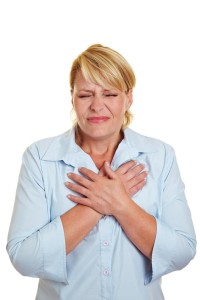Palpitations are described as a sensation that the heart skipped a beat or added an extra beat. It feels as if the heart is pounding, racing or fluttering. The individual is highly aware of his/her heartbeat. The sensation can also be felt in the throat, neck or the chest. It is also likely that the heart rhythm can change during the palpitations.
Most of the heart palpitations are relatively harmless and settles on their own without requiring treatment. In rare instances, the palpitations might be an indication of a serious ailment.
What are the usual causes?
The possible causes of heart palpitations usually include the following:
- Caffeine
- Rigorous exercise or physical activity

Most of the heart palpitations are relatively harmless and settles on their own without requiring treatment. - Anxiety
- Stress
- Panic
- Nicotine from tobacco products such as cigars and cigarettes
- Anemia
- Dehydration
- Electrolyte irregularities
- Hormonal changes including pregnancy
- Low blood sugar
- Blood loss
- Overly active thyroid or hyperthyroidism
- Using over-the-counter medications including cough and cold medications, herbal supplements and nutritional supplements
- Shock
- Low levels of oxygen or carbon dioxide in the blood
- Fever
- Smoking
- Heart disease
- Abnormal heart valves
- Arrhythmia
- Using prohibited drugs such as codeine and amphetamines
- Prescription medications including asthma inhalers, beta-blockers and decongestants
When to seek medical care
It is vital to seek immediate medical care right away if heart palpitations are present and diagnosed with heart issues. Consult a doctor if the palpitations occur with other symptoms such as:
- Weakness
- Dizziness
- Confusion
- Loss of consciousness
- Difficulty breathing
- Lightheadedness
- Fainting
- Pressure, pain or tightening in the chest
- Excessive sweating
- Resting pulse rate higher than 100 beats per minute
- Pain in the neck, arms, chest, jaw or upper back
Management
The treatment is based on the exact causes of the palpitations. The doctor should deal with any underlying medical condition. In most instances, the doctor could not determine the cause and cannot provide treatment.
If the palpitations are brought about by lifestyle choices such as excessive consumption of caffeine or smoking, reducing or eliminating them is required.
Preventive measures
If the doctor determines that treatment is not required, these steps should be observed to reduce the chances of developing palpitations:
- Identifying the triggers so that they can be avoided. This requires the individual to keep a record of activities, foods and beverages eaten and noting down when palpitations arise.
- Reduce or stop the intake of caffeine
- If stressed or anxious, relaxation exercises such as yoga, deep breathing or tai chi are recommended.
- A healthy diet
- Avoid smoking or using tobacco products
- Regular exercise
- If medications are the cause, a doctor should be consulted for suitable alternatives.
- The blood pressure and cholesterol levels should be kept under control
Quick Note / Disclaimer
The material posted on this page on palpitations is for learning and educational purposes only. To learn to recognize and manage circulatory ailments, register for a first aid and CPR course with Saskatoon First Aid.

